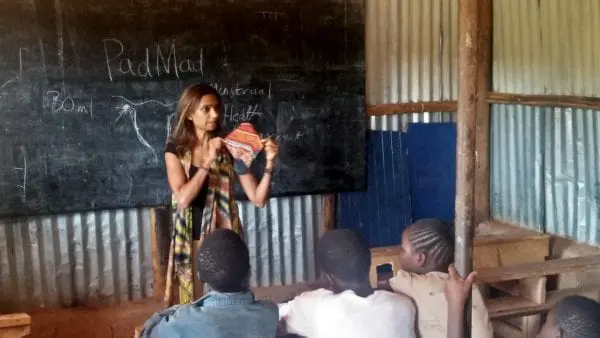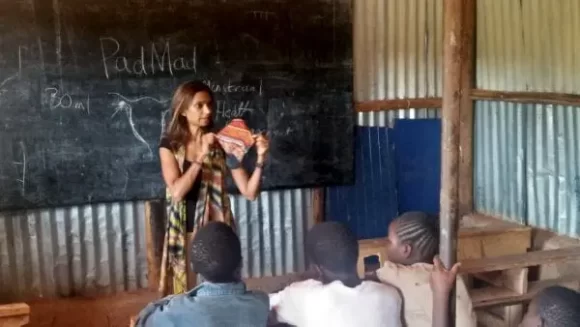As you’ll already know if you’re familiar with WalkingWomen, we’re here to support women not just in the UK who want to explore the world with like-minded women but to champion those inspirational women tackling women’s issues both in the UK and around the world.
Today, we’re proud to highlight the work of Madvhi Dalal, head of the charity PadMad, which works tirelessly to educate, inform and inspire improvements to women’s health in a sustainable manner.
Here, we ask PadMad’s inspirational founder to tell us a little more about how the charity came into being and give us some insight into the issues surrounding the eradication of period poverty in Kenya.

WW: From Yoga to a social enterprise that covers so much more, what made you take on period poverty in Kenya?
When I was working in Kenya to teach students yoga and dance, I discovered that the girls were missing school and effectively falling behind simply because of a lack of sanitary pads. Wanting to know whether it was a localised or national issue, I travelled around Kenya and discovered what girls there go through. Perhaps one of the more shocking discoveries I made was of a trend known as ‘sex for pads’, which basically meant transactional sex for a pack of sanitary pads.
WW: So, how did you come up with the idea of locally produced pads?
Sanitary pads are expensive. And there’s a certain stigma for women in talking about periods, so they’ve resorted to using all sorts of items to hand-fashion pads for themselves to avoid this. I’ve seen the use of mattresses, pellets wrapped in tissue and even leaves being used. Initially, I thought that I’d design a pad that could be reused, and I’d teach the girls to sew them for themselves. But the problem with that is that they don’t have the time for that, and the lack of materials doesn’t help.
Looking at the wider issues women in Kenya face, I found a way to bring marginalised women into the fold. I train women such as widows, those who are HIV positive, and single mums who have been abused how to sew the pads, and I provide the materials they need. Once a pad is finished, they don’t have to go about selling them in the wider community. I am their buyer too. I buy every pad they make.
WW: What barriers have you come up against?
The challenge of ignorance is a big one. Also, Some people assume you need lots of water to clean the pads hygienically. Those making decisions on whether to donate are sometimes older men who don’t recognise the science and chemistry of menstruation, and this can be tough to get over, as some are unconvinced that this is actually a cleaner product than the single-use pad,
WW: What are the benefits of the PadMad reusable pads?
Aside from providing those marginalised in their community with a way to earn and aiming to end period poverty in Kenya, the PadMad pads also contain no toxins and are 100% biodegradable. I wanted to provide these women with a sustainable solution that doesn’t negatively impact the planet. After all, disposable pads take up to 800 years to decompose. On the other hand, PadMad pads biodegrade within just six months.
WW: But PadMad isn’t just about period poverty, is it? Can you tell us about the other work you do?
PadMad aims to put an end to period poverty in Kenya, but we also want to reduce the stigma surrounding periods. We do so by providing mental health management and sexual reproductive health rights education. We’ve provided workshops to over 20,000 girls, where we discuss more than the scant information in the Kenyan curriculum. We discuss what’s normal and what’s not; and when to seek medical help. And I insist that the boys attend too. We aim to develop a safe space for these girls and to improve communication between the young people and their teachers too.
WW: What’s next for PadMad?
We’d love to expand. I’m trying to develop an even more affordable product and sell across the globe online, focusing on Sweden, Germany and the UK.
WW: How can we support you?
Donations are obviously always a great way to go. When you think that a donation of £5-£6 can stop a girl from having to resort to prostitution for around 5-6 years, it only takes a small amount to make a difference. Talking about this sort of thing helps, too, along with the environmental impact of sanitary wear and opting for a more sustainable solution. Only by keeping the conversation going can we aim to stop the stigma of periods and period poverty in Kenya and other places women face such stigma too.
Want to get involved?
If, after reading Madvi’s interview, you’re keen to get involved and help end period poverty in Kenya and its associated impact on Kenyan women, there are a few ways in which you can act.
If you want to donate directly to PadMad, you can do so on their website.
Here at Walking Women, we were so inspired by PadMad’s campaign that we have decided that on our next Kenyan walking holiday WalkingWomen on Safari in Kenya, we’d like to support Kenyan women by donating a proportion of the costs of every walker to help PadMad continue this fantastic enterprise. To find out more, simply get in touch with us or why not join our trip to see the work for yourself.

